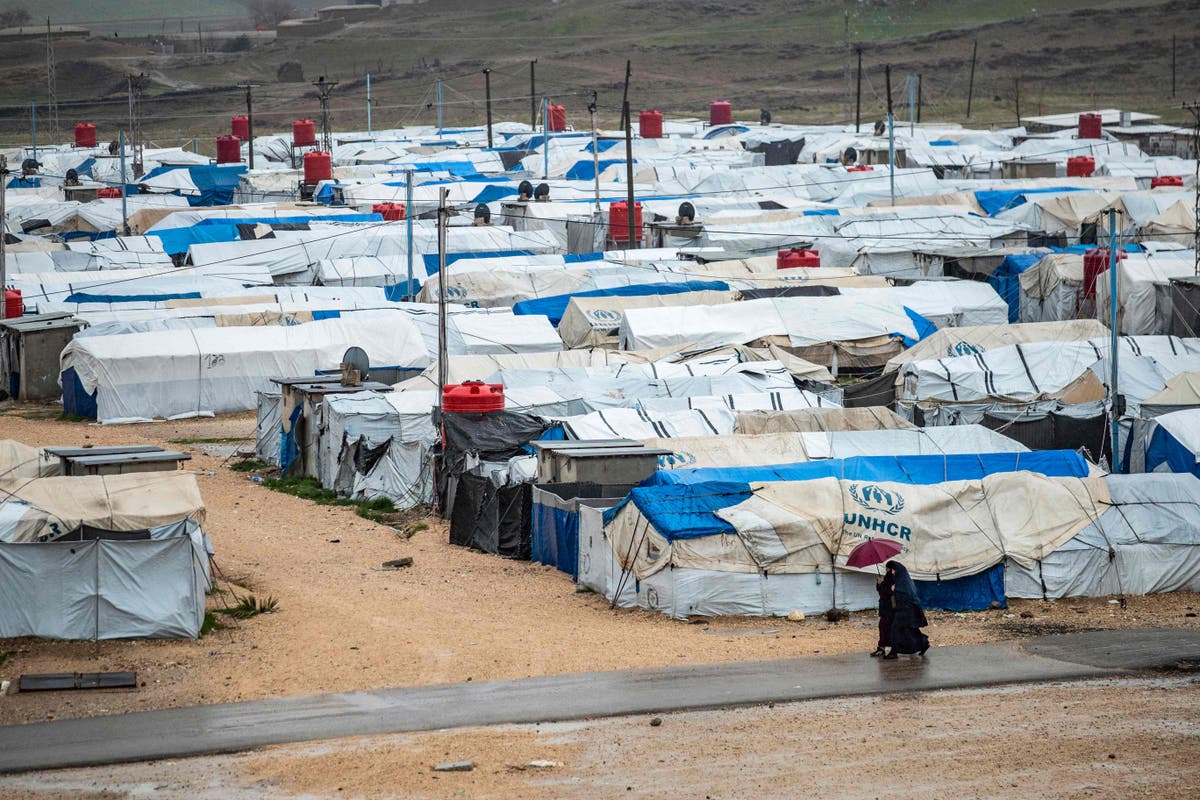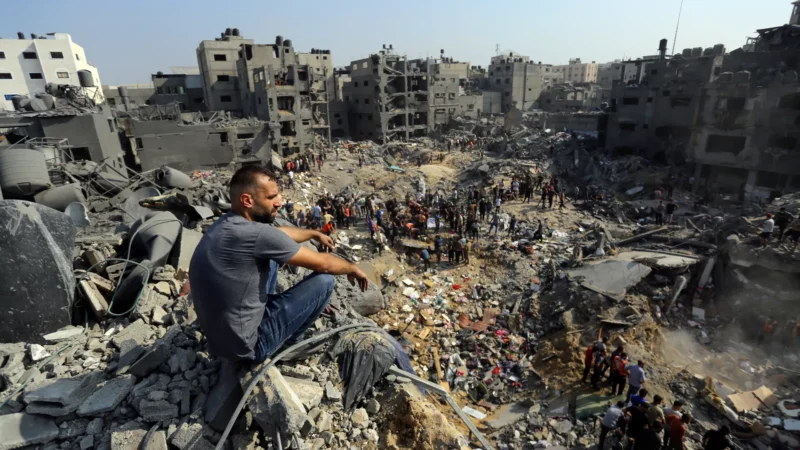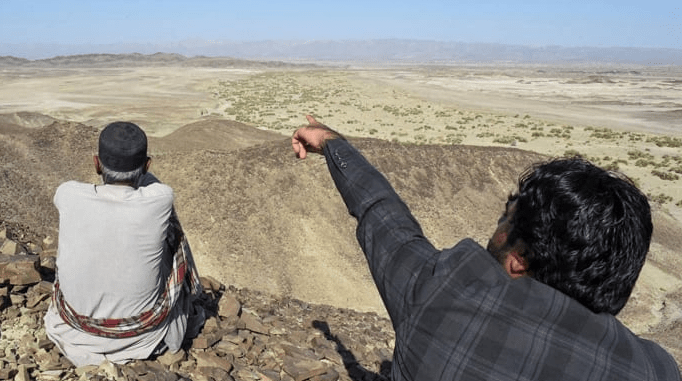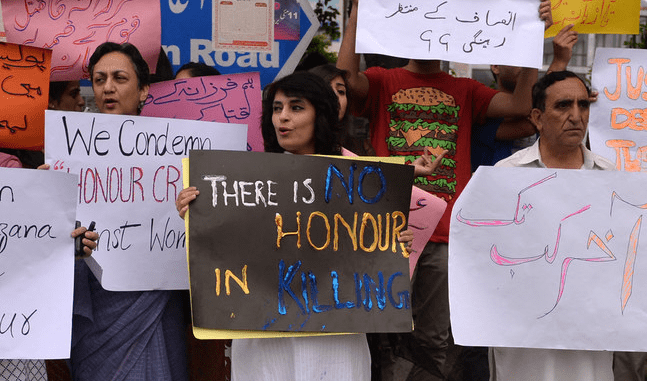UK handing ‘propaganda gift to Isis’ by refusing to repatriate detainees from Syria

The government is handing a “propaganda gift to Isis” by refusing to repatriate detainees from squalid camps in Syria, a report has found.
The All-Party Parliamentary Group (APPG) on Trafficked Britons in Syria said the policy of leaving jihadis from the UK in indefinite detention was creating security risks.
“Should the detention facilities collapse, the impact on national and global security could be extremely serious,” said a report published on Thursday.
“In the meantime, the propaganda value to Isis of holding women and children in inhuman detention without charge or trial is enormous.”
The APPG said the situation was a “propaganda gift to Isis”, after receiving evidence from experts that it was using the al-Hol camp to incite supporters “almost daily”.
Isis has repeatedly called for supporters to break detainees out of prisons, and used reports of deaths and suffering in its narrative of oppression by Western countries and their allies.
The Kurdish authorities that administer the detention facilities told the APPG that the situation was “very dangerous” and called the al-Hol camp a “ticking time bomb”.
“It is unlikely to be able to hold these detainees forever,” the report said. “The UK’s closest security allies, including the US, have repeatedly called upon the UK to repatriate all of its nationals from north-east Syria in the interests of regional and global security.
“The UK government must repatriate British nationals in detention not only to ensure their safety but also our own.”
The APPG’s findings stated that the women and children being indefinitely detained may be trafficked by Isis, and any mass escapes could “fuel a resurgence of violence and terrorism in the region”.
Last month, launched a sophisticated attack on a prison for male alleged Isis members in Hasakah, resulting in a days-long battle with Kurdish forces.
A woman with her child in the al-Roj camp (AFP via Getty Images)
An estimated 500 people died – mostly Isis members according to the Syrian Democratic forces – and an unknown number of jihadis escaped. Prisoners told relatives several child inmates had been killed.
Conservative MP Andrew Mitchell, co-chair of the APPG, said: “The government’s approach to British nationals detained in Syria is morally reprehensible, legally dubious and utterly negligent from a security perspective.
“It is also unsustainable, as a recent Isis attack on a Kurdish detention facility has shown.”
The report also found that many of the alleged Isis members “abandoned” by the government may originally have been trafficked to Isis territories, or within the former “caliphate”.
“The evidence seen by the APPG illustrates the ways in which British girls and women in particular were taken to Syria by coercive means and were subjected to sexual exploitation, forced marriage, and other forms of exploitation,” it said.
“The UK government failed to take necessary steps to prevent the trafficking of vulnerable British nationals by Isis … it has failed to provide victims with the support and protection to which they are entitled under British law.”
While refusing to repatriate jihadis from Syrian camps and prisons, the government has stripped many of their British citizenship in an effort to prevent them returning to the UK.
The APPG said the policy was racially discriminatory and “simply shifts responsibility for the issue onto other countries who may be less well equipped to manage it”.
After losing a legal challenge brought by a female alleged Isis member, the government is using the Nationality and Borders Bill to change the law so it does not have to give notice to people being deprived of their British citizenship.
Timeline of the Isis caliphate Show all 19 1 /19 Timeline of the Isis caliphate Timeline of the Isis caliphate ISIS began as a group by the merging of extremist organisations ISI and al-Nusra in 2013. Following clashes, Syrian rebels captured the ISIS headquarters in Aleppo in January 2014 (pictured) AFP/Getty Timeline of the Isis caliphate Abu Bakr Al-Baghdadi declared the creation of a caliphate in Mosul on 27 June 2014 Timeline of the Isis caliphate Isis conquered the Kurdish towns of Sinjar and Zumar in August 2014, forcing thousands of civilians to flee their homes. Pictured are a group of Yazidi Kurds who have fled Rex Timeline of the Isis caliphate On September 2 2014 Isis released a video depicting the beheading of US journalist Steven Sotloff. On September 13 they released another video showing the execution of British aid worker David Haines Timeline of the Isis caliphate The US launched its first airstrikes against Isis in Syria on 23 September 2014. Here Lt Gen William C Mayville Jnr speaks about the bombing campaign in the wake of the first strikes Getty Timeline of the Isis caliphate Isis militants sit atop a hill planted with their flag in the Syrian town of Kobani on 6 October 2014. They had been advancing on Kobani since mid-September and by now was in control of the city’s entrance and exit points AFP/Getty Timeline of the Isis caliphate Residents of the border village of Alizar keep guard day and night as they wait in fear of mortar fire from Isis who have occupied the nearby city of Kobani Getty Timeline of the Isis caliphate Smoke rises following a US airstrike on Kobani, 28 October 2014 AFP/Getty Timeline of the Isis caliphate YPG fighters raise a flag as they reclaim Kobani on 26 January 2015 VOA Timeline of the Isis caliphate Isis seized the ancient Syrian city of Palmyra on 20 May 2015. This image show the city from above days after its capture by Isis Getty Timeline of the Isis caliphate Kurdish forces are stationed on a hill above the town of Sinjar as smoke rises following US airstrikes on 12 November 2015 AFP/Getty Timeline of the Isis caliphate Kurdish forces enter Sinjar after seizing it from Isis control on 13 November 2015 AFP/Getty Timeline of the Isis caliphate Iraqi government forces make the victory sign as they retake the city of Fallujah from ISIS on 26 June 2016 Getty Timeline of the Isis caliphate Iraqi forces battle with Isis for the city of Mosul on 30 June 2017 AFP/Getty Timeline of the Isis caliphate Members of the Iraqi federal police raise flags in Mosul on 8 July 2017. On the following day, Iraqi prime minister Haider Al Abadi declares victory over Isis in Mosul Getty Timeline of the Isis caliphate Members of Syrian Democratic Forces celebrate in Al-Naim square after taking back the city of Raqqa from Isis. US-backed Syrian forces declare victory over Isis in Raqqa on 20 October 2017 after a four-month long campaign Getty Timeline of the Isis caliphate Female fighters of the Syrian Democratic Forces celebrate in Al-Naim Square after taking back the city of Raqqa from Isis. US-backed Syrian forces declare victory over Isis in Raqqa on 20 October 2017 after a four-month long campaign AFP/Getty Timeline of the Isis caliphate Trucks full of women and children arrive from the last Isis-held areas in Deir ez-Zor, Syria in January 2019 They were among the last civilians to be living in the ISIS caliphate, by this time reduced to just two small villages in Syria’s Deir ez-Zor Richard Hall/The Independent Timeline of the Isis caliphate Zikia Ibrahim, 28, with her two-year-old son and 8-month-old daughter, after fleeing the Isis caliphate, on Saturday 26 January 2019 Richard Hall/The Independent
The APPG said it was concerned about the proposals, and that the refusal to put alleged terrorists on trial in Britain was “fostering impunity for crimes committed by Isis”.
MPs said the UK was increasingly becoming an “outlier” among international allies, after a UN inquiry found that at least 322 children and 56 women have so far been repatriated to 13 different home countries.
The US Coordinator for Counterterrorism and Special Envoy for the Defeat ISIS Coalition, John Godfrey, told the APPG that citizenship stripping “defers the problem and puts the burden on local partners”.
He added: “The US government urges countries of origin to repatriate, reintegrate and, where appropriate, prosecute and incarcerate foreign fighters and their family members.”
The Autonomous Administration of North and East Syria (AANES), which runs the camps, told the inquiry that it is “ready to provide unconditional assistance and cooperation with the UK to hand over its citizens” if it receives an official request.
The Roj and al-Hol camps are currently holding around 60,000 people, including 40,000 children, in “dire” conditions where violence, deadly fires and illness have claimed at least 163 lives, the report added.
APPG co-chair Lord Jay said: “It is vital that we learn from the failure of UK public bodies to prevent Isis from trafficking British women and girls.
“But rather than seek to understand how things went so badly wrong, the Government is doubling down on these failed policies by stripping potential trafficking victims of citizenship. A complete change of course is needed, beginning with the repatriation of all British families detained in north-east Syria.”
The government said it was seeking to facilitate the return of British orphans and unaccompanied minors “where feasible”, but not their parents.
A spokesperson added: “Our priority is to ensure the safety and security of the UK. Those who remain in the conflict zone include some of the most dangerous individuals, choosing to stay to fight or otherwise support Isis.”
The government said it was aware of security and safety difficulties in the camps but said the conditions were “ultimately the responsibility of the camp authorities,” adding: “We continue to work with international partners to support camps in Syria, funding the provision of life-saving supplies including food, water, healthcare and shelter.”






